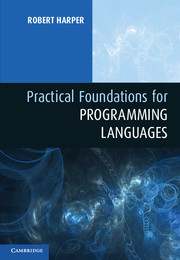Book contents
- Frontmatter
- Contents
- Preface
- Part I Judgments and Rules
- Part II Statics and Dynamics
- Part III Function Types
- Part IV Finite Data Types
- Part V Infinite Data Types
- Part VI Dynamic Types
- Part VII Variable Types
- Part VIII Subtyping
- Part IX Classes and Methods
- 25 Dynamic Dispatch
- 26 Inheritance
- Part X Exceptions and Continuations
- Part XI Types and Propositions
- Part XII Symbols
- Part XIII State
- Part XIV Laziness
- Part XV Parallelism
- Part XVI Concurrency
- Part XVII Modularity
- Part XVIII Equational Reasoning
- Part XIX Appendix
- Bibliography
- Index
26 - Inheritance
from Part IX - Classes and Methods
Published online by Cambridge University Press: 05 February 2013
- Frontmatter
- Contents
- Preface
- Part I Judgments and Rules
- Part II Statics and Dynamics
- Part III Function Types
- Part IV Finite Data Types
- Part V Infinite Data Types
- Part VI Dynamic Types
- Part VII Variable Types
- Part VIII Subtyping
- Part IX Classes and Methods
- 25 Dynamic Dispatch
- 26 Inheritance
- Part X Exceptions and Continuations
- Part XI Types and Propositions
- Part XII Symbols
- Part XIII State
- Part XIV Laziness
- Part XV Parallelism
- Part XVI Concurrency
- Part XVII Modularity
- Part XVIII Equational Reasoning
- Part XIX Appendix
- Bibliography
- Index
Summary
In this chapter we build on Chapter 25 and consider the process of defining the dispatch matrix that determines the behavior of each method on each class. A common strategy is to build the dispatch matrix incrementally by adding new classes or methods to an existing dispatch matrix. To add a class requires that we define the behavior of each method on objects of that class, and to define a method requires that we define the behavior of that method on objects of each of the classes. The definitions of these behaviors may be given by any means available in the language. However, it is often suggested that a useful means of defining a new class is to inherit the behavior of another class on some methods and to override its behavior on others, resulting in an amalgam of the old and new behaviors. The new class is often called a subclass of the old class, which is then called the superclass. Similarly, a new method may be defined by inheriting the behavior of another method on some classes and overriding the behavior on others. By analogy, we may call the new method a submethod of a given supermethod. (It is also possible to admit multiple superclasses or multiple supermethods, but we confine our attention to single, rather than multiple, inheritance.) For simplicity we restrict attention to the simple, non-self-referential case in the following development.
- Type
- Chapter
- Information
- Practical Foundations for Programming Languages , pp. 209 - 214Publisher: Cambridge University PressPrint publication year: 2012

